Analyzing the Empathy Gap: Technology's Role in Human Relationships
VerifiedAdded on 2022/08/17
|5
|1323
|22
Essay
AI Summary
This essay delves into the empathy gap that has emerged in modern society due to the pervasive influence of technology. Drawing heavily on the work of Sherry Turkle, the essay examines how increased digital interactions, particularly through smartphones and social media, are diminishing people's capacity for empathy and self-awareness. It explores the ways in which technology is altering human relationships, making them more superficial and emotionally detached, and creating an illusion of connection. The essay discusses the shift towards individualism, where etiquette codes are ignored due to mobile phone usage, and how face-to-face interactions, crucial for building empathy and trust, are being marginalized. The conclusion emphasizes the need to control smartphone usage to preserve relationships and challenges readers to consider the long-term impact of technology on human interactions.
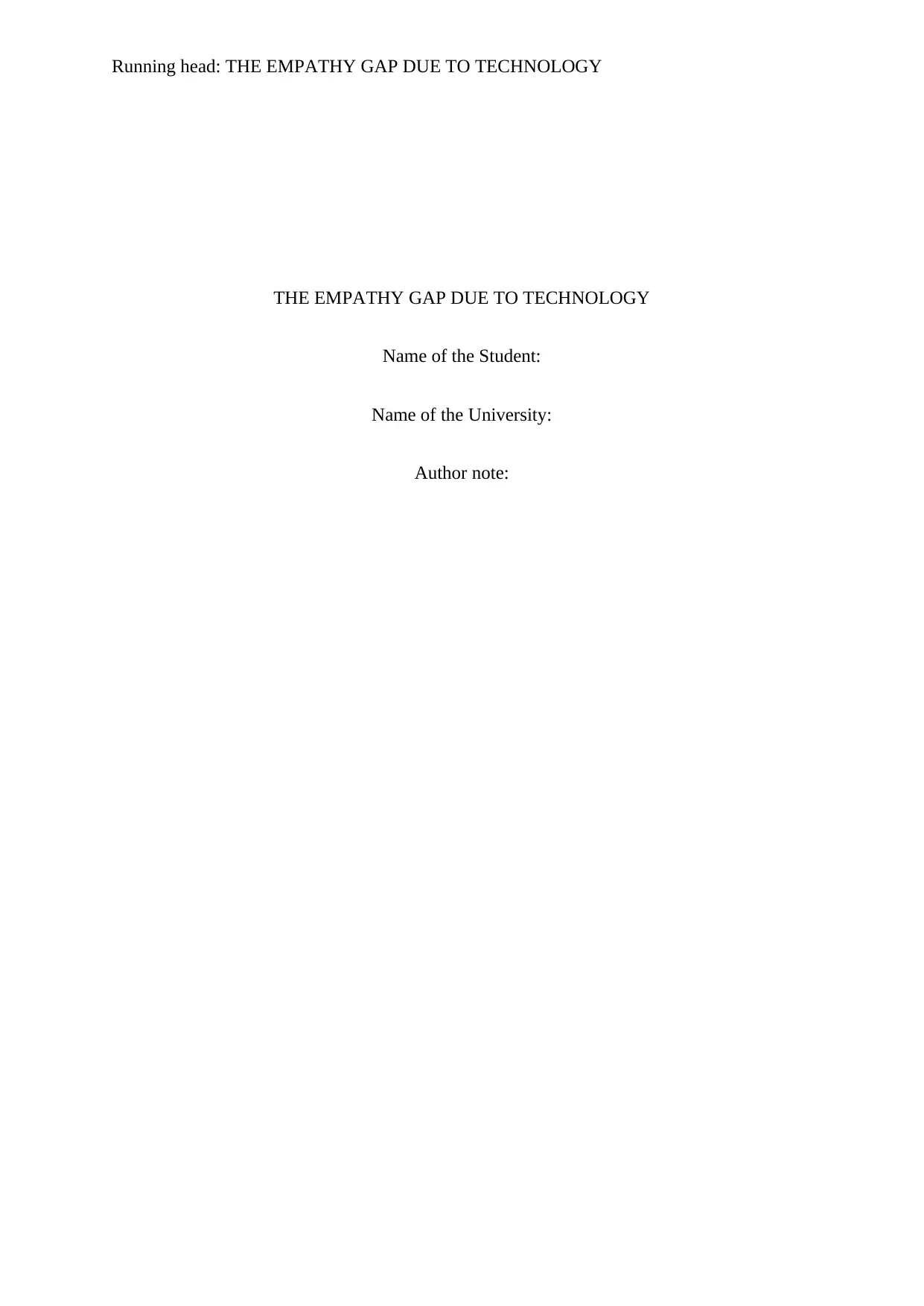
Running head: THE EMPATHY GAP DUE TO TECHNOLOGY
THE EMPATHY GAP DUE TO TECHNOLOGY
Name of the Student:
Name of the University:
Author note:
THE EMPATHY GAP DUE TO TECHNOLOGY
Name of the Student:
Name of the University:
Author note:
Paraphrase This Document
Need a fresh take? Get an instant paraphrase of this document with our AI Paraphraser
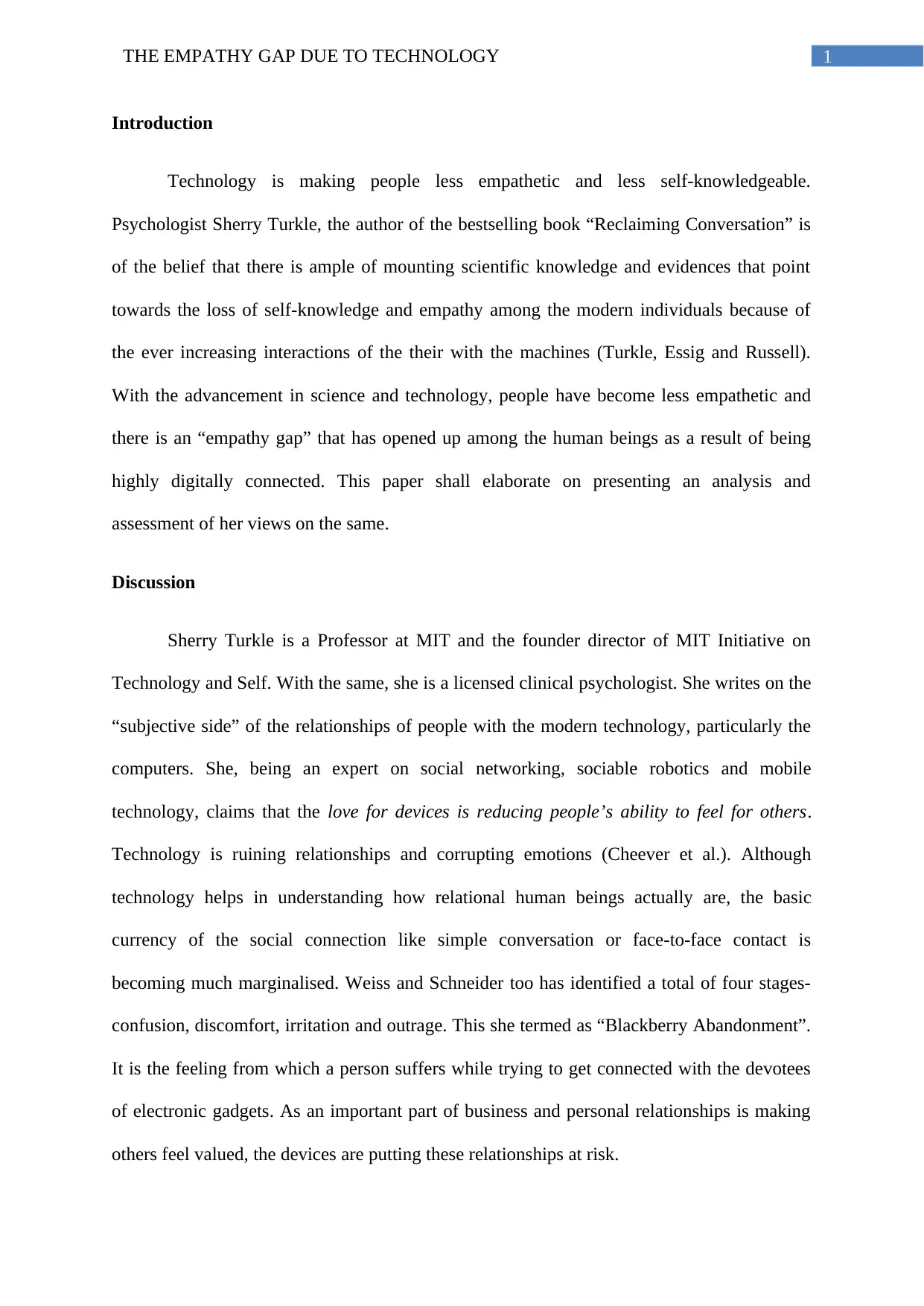
1THE EMPATHY GAP DUE TO TECHNOLOGY
Introduction
Technology is making people less empathetic and less self-knowledgeable.
Psychologist Sherry Turkle, the author of the bestselling book “Reclaiming Conversation” is
of the belief that there is ample of mounting scientific knowledge and evidences that point
towards the loss of self-knowledge and empathy among the modern individuals because of
the ever increasing interactions of the their with the machines (Turkle, Essig and Russell).
With the advancement in science and technology, people have become less empathetic and
there is an “empathy gap” that has opened up among the human beings as a result of being
highly digitally connected. This paper shall elaborate on presenting an analysis and
assessment of her views on the same.
Discussion
Sherry Turkle is a Professor at MIT and the founder director of MIT Initiative on
Technology and Self. With the same, she is a licensed clinical psychologist. She writes on the
“subjective side” of the relationships of people with the modern technology, particularly the
computers. She, being an expert on social networking, sociable robotics and mobile
technology, claims that the love for devices is reducing people’s ability to feel for others.
Technology is ruining relationships and corrupting emotions (Cheever et al.). Although
technology helps in understanding how relational human beings actually are, the basic
currency of the social connection like simple conversation or face-to-face contact is
becoming much marginalised. Weiss and Schneider too has identified a total of four stages-
confusion, discomfort, irritation and outrage. This she termed as “Blackberry Abandonment”.
It is the feeling from which a person suffers while trying to get connected with the devotees
of electronic gadgets. As an important part of business and personal relationships is making
others feel valued, the devices are putting these relationships at risk.
Introduction
Technology is making people less empathetic and less self-knowledgeable.
Psychologist Sherry Turkle, the author of the bestselling book “Reclaiming Conversation” is
of the belief that there is ample of mounting scientific knowledge and evidences that point
towards the loss of self-knowledge and empathy among the modern individuals because of
the ever increasing interactions of the their with the machines (Turkle, Essig and Russell).
With the advancement in science and technology, people have become less empathetic and
there is an “empathy gap” that has opened up among the human beings as a result of being
highly digitally connected. This paper shall elaborate on presenting an analysis and
assessment of her views on the same.
Discussion
Sherry Turkle is a Professor at MIT and the founder director of MIT Initiative on
Technology and Self. With the same, she is a licensed clinical psychologist. She writes on the
“subjective side” of the relationships of people with the modern technology, particularly the
computers. She, being an expert on social networking, sociable robotics and mobile
technology, claims that the love for devices is reducing people’s ability to feel for others.
Technology is ruining relationships and corrupting emotions (Cheever et al.). Although
technology helps in understanding how relational human beings actually are, the basic
currency of the social connection like simple conversation or face-to-face contact is
becoming much marginalised. Weiss and Schneider too has identified a total of four stages-
confusion, discomfort, irritation and outrage. This she termed as “Blackberry Abandonment”.
It is the feeling from which a person suffers while trying to get connected with the devotees
of electronic gadgets. As an important part of business and personal relationships is making
others feel valued, the devices are putting these relationships at risk.
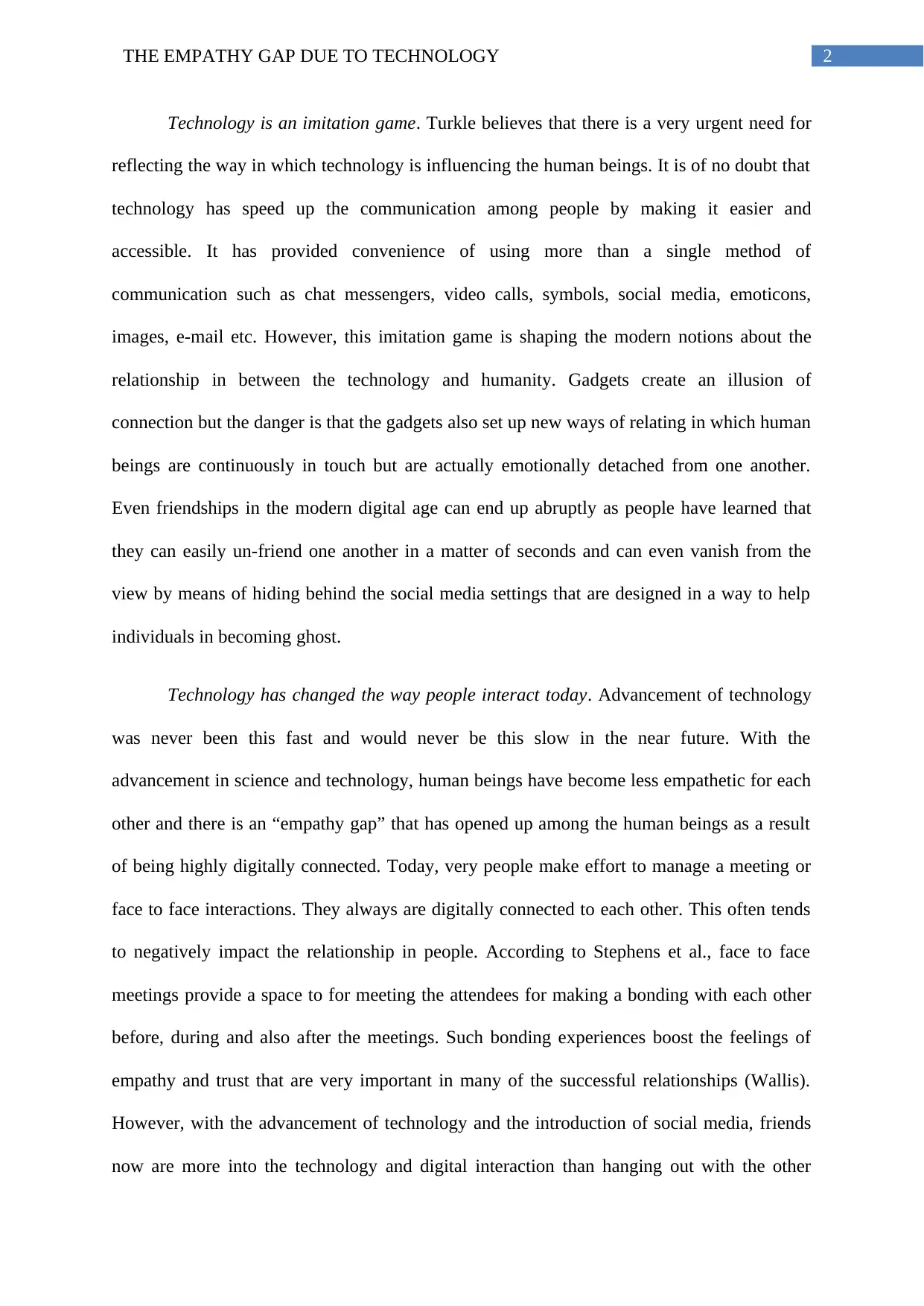
2THE EMPATHY GAP DUE TO TECHNOLOGY
Technology is an imitation game. Turkle believes that there is a very urgent need for
reflecting the way in which technology is influencing the human beings. It is of no doubt that
technology has speed up the communication among people by making it easier and
accessible. It has provided convenience of using more than a single method of
communication such as chat messengers, video calls, symbols, social media, emoticons,
images, e-mail etc. However, this imitation game is shaping the modern notions about the
relationship in between the technology and humanity. Gadgets create an illusion of
connection but the danger is that the gadgets also set up new ways of relating in which human
beings are continuously in touch but are actually emotionally detached from one another.
Even friendships in the modern digital age can end up abruptly as people have learned that
they can easily un-friend one another in a matter of seconds and can even vanish from the
view by means of hiding behind the social media settings that are designed in a way to help
individuals in becoming ghost.
Technology has changed the way people interact today. Advancement of technology
was never been this fast and would never be this slow in the near future. With the
advancement in science and technology, human beings have become less empathetic for each
other and there is an “empathy gap” that has opened up among the human beings as a result
of being highly digitally connected. Today, very people make effort to manage a meeting or
face to face interactions. They always are digitally connected to each other. This often tends
to negatively impact the relationship in people. According to Stephens et al., face to face
meetings provide a space to for meeting the attendees for making a bonding with each other
before, during and also after the meetings. Such bonding experiences boost the feelings of
empathy and trust that are very important in many of the successful relationships (Wallis).
However, with the advancement of technology and the introduction of social media, friends
now are more into the technology and digital interaction than hanging out with the other
Technology is an imitation game. Turkle believes that there is a very urgent need for
reflecting the way in which technology is influencing the human beings. It is of no doubt that
technology has speed up the communication among people by making it easier and
accessible. It has provided convenience of using more than a single method of
communication such as chat messengers, video calls, symbols, social media, emoticons,
images, e-mail etc. However, this imitation game is shaping the modern notions about the
relationship in between the technology and humanity. Gadgets create an illusion of
connection but the danger is that the gadgets also set up new ways of relating in which human
beings are continuously in touch but are actually emotionally detached from one another.
Even friendships in the modern digital age can end up abruptly as people have learned that
they can easily un-friend one another in a matter of seconds and can even vanish from the
view by means of hiding behind the social media settings that are designed in a way to help
individuals in becoming ghost.
Technology has changed the way people interact today. Advancement of technology
was never been this fast and would never be this slow in the near future. With the
advancement in science and technology, human beings have become less empathetic for each
other and there is an “empathy gap” that has opened up among the human beings as a result
of being highly digitally connected. Today, very people make effort to manage a meeting or
face to face interactions. They always are digitally connected to each other. This often tends
to negatively impact the relationship in people. According to Stephens et al., face to face
meetings provide a space to for meeting the attendees for making a bonding with each other
before, during and also after the meetings. Such bonding experiences boost the feelings of
empathy and trust that are very important in many of the successful relationships (Wallis).
However, with the advancement of technology and the introduction of social media, friends
now are more into the technology and digital interaction than hanging out with the other
⊘ This is a preview!⊘
Do you want full access?
Subscribe today to unlock all pages.

Trusted by 1+ million students worldwide
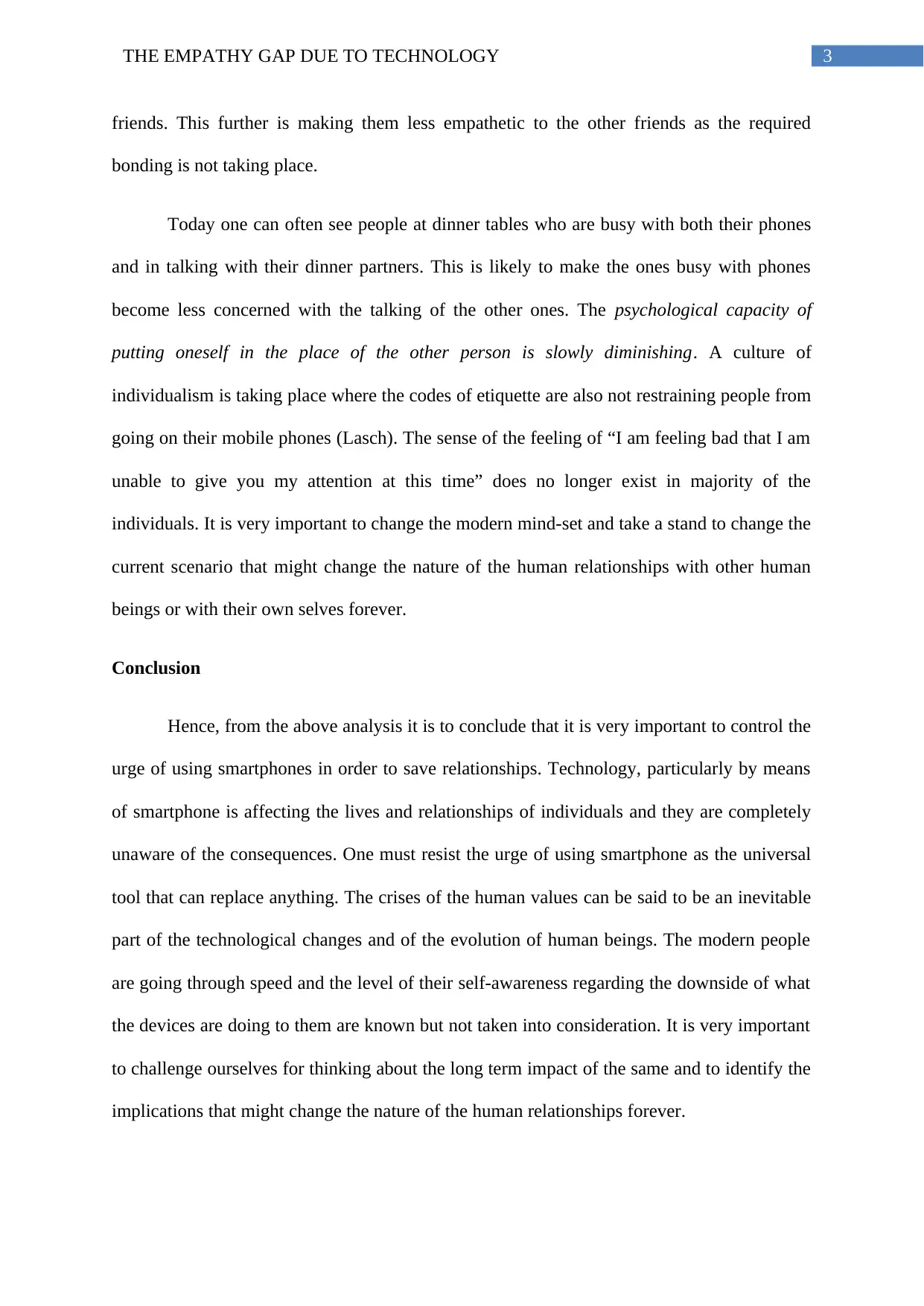
3THE EMPATHY GAP DUE TO TECHNOLOGY
friends. This further is making them less empathetic to the other friends as the required
bonding is not taking place.
Today one can often see people at dinner tables who are busy with both their phones
and in talking with their dinner partners. This is likely to make the ones busy with phones
become less concerned with the talking of the other ones. The psychological capacity of
putting oneself in the place of the other person is slowly diminishing. A culture of
individualism is taking place where the codes of etiquette are also not restraining people from
going on their mobile phones (Lasch). The sense of the feeling of “I am feeling bad that I am
unable to give you my attention at this time” does no longer exist in majority of the
individuals. It is very important to change the modern mind-set and take a stand to change the
current scenario that might change the nature of the human relationships with other human
beings or with their own selves forever.
Conclusion
Hence, from the above analysis it is to conclude that it is very important to control the
urge of using smartphones in order to save relationships. Technology, particularly by means
of smartphone is affecting the lives and relationships of individuals and they are completely
unaware of the consequences. One must resist the urge of using smartphone as the universal
tool that can replace anything. The crises of the human values can be said to be an inevitable
part of the technological changes and of the evolution of human beings. The modern people
are going through speed and the level of their self-awareness regarding the downside of what
the devices are doing to them are known but not taken into consideration. It is very important
to challenge ourselves for thinking about the long term impact of the same and to identify the
implications that might change the nature of the human relationships forever.
friends. This further is making them less empathetic to the other friends as the required
bonding is not taking place.
Today one can often see people at dinner tables who are busy with both their phones
and in talking with their dinner partners. This is likely to make the ones busy with phones
become less concerned with the talking of the other ones. The psychological capacity of
putting oneself in the place of the other person is slowly diminishing. A culture of
individualism is taking place where the codes of etiquette are also not restraining people from
going on their mobile phones (Lasch). The sense of the feeling of “I am feeling bad that I am
unable to give you my attention at this time” does no longer exist in majority of the
individuals. It is very important to change the modern mind-set and take a stand to change the
current scenario that might change the nature of the human relationships with other human
beings or with their own selves forever.
Conclusion
Hence, from the above analysis it is to conclude that it is very important to control the
urge of using smartphones in order to save relationships. Technology, particularly by means
of smartphone is affecting the lives and relationships of individuals and they are completely
unaware of the consequences. One must resist the urge of using smartphone as the universal
tool that can replace anything. The crises of the human values can be said to be an inevitable
part of the technological changes and of the evolution of human beings. The modern people
are going through speed and the level of their self-awareness regarding the downside of what
the devices are doing to them are known but not taken into consideration. It is very important
to challenge ourselves for thinking about the long term impact of the same and to identify the
implications that might change the nature of the human relationships forever.
Paraphrase This Document
Need a fresh take? Get an instant paraphrase of this document with our AI Paraphraser
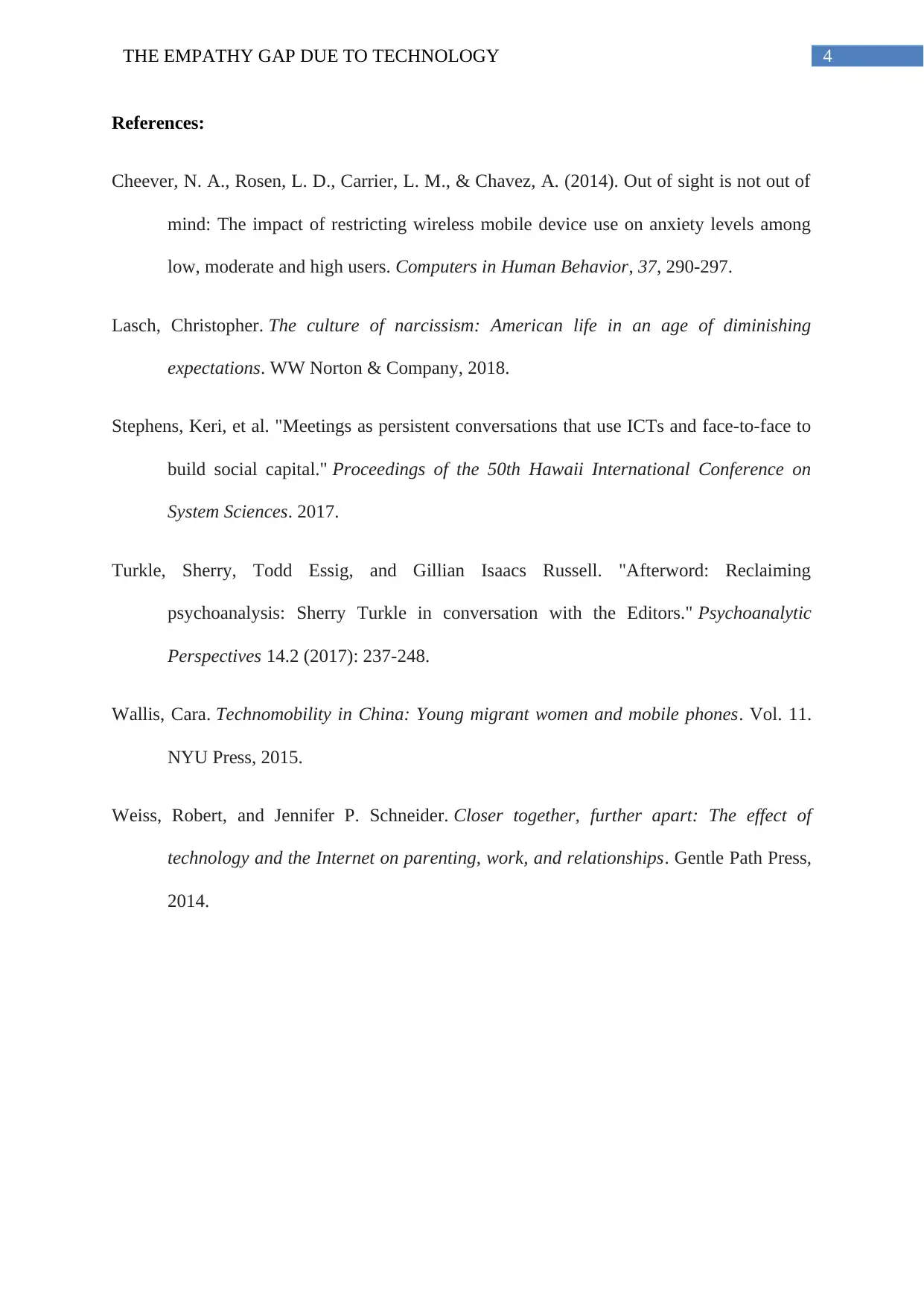
4THE EMPATHY GAP DUE TO TECHNOLOGY
References:
Cheever, N. A., Rosen, L. D., Carrier, L. M., & Chavez, A. (2014). Out of sight is not out of
mind: The impact of restricting wireless mobile device use on anxiety levels among
low, moderate and high users. Computers in Human Behavior, 37, 290-297.
Lasch, Christopher. The culture of narcissism: American life in an age of diminishing
expectations. WW Norton & Company, 2018.
Stephens, Keri, et al. "Meetings as persistent conversations that use ICTs and face-to-face to
build social capital." Proceedings of the 50th Hawaii International Conference on
System Sciences. 2017.
Turkle, Sherry, Todd Essig, and Gillian Isaacs Russell. "Afterword: Reclaiming
psychoanalysis: Sherry Turkle in conversation with the Editors." Psychoanalytic
Perspectives 14.2 (2017): 237-248.
Wallis, Cara. Technomobility in China: Young migrant women and mobile phones. Vol. 11.
NYU Press, 2015.
Weiss, Robert, and Jennifer P. Schneider. Closer together, further apart: The effect of
technology and the Internet on parenting, work, and relationships. Gentle Path Press,
2014.
References:
Cheever, N. A., Rosen, L. D., Carrier, L. M., & Chavez, A. (2014). Out of sight is not out of
mind: The impact of restricting wireless mobile device use on anxiety levels among
low, moderate and high users. Computers in Human Behavior, 37, 290-297.
Lasch, Christopher. The culture of narcissism: American life in an age of diminishing
expectations. WW Norton & Company, 2018.
Stephens, Keri, et al. "Meetings as persistent conversations that use ICTs and face-to-face to
build social capital." Proceedings of the 50th Hawaii International Conference on
System Sciences. 2017.
Turkle, Sherry, Todd Essig, and Gillian Isaacs Russell. "Afterword: Reclaiming
psychoanalysis: Sherry Turkle in conversation with the Editors." Psychoanalytic
Perspectives 14.2 (2017): 237-248.
Wallis, Cara. Technomobility in China: Young migrant women and mobile phones. Vol. 11.
NYU Press, 2015.
Weiss, Robert, and Jennifer P. Schneider. Closer together, further apart: The effect of
technology and the Internet on parenting, work, and relationships. Gentle Path Press,
2014.
1 out of 5
Related Documents
Your All-in-One AI-Powered Toolkit for Academic Success.
+13062052269
info@desklib.com
Available 24*7 on WhatsApp / Email
![[object Object]](/_next/static/media/star-bottom.7253800d.svg)
Unlock your academic potential
Copyright © 2020–2025 A2Z Services. All Rights Reserved. Developed and managed by ZUCOL.



